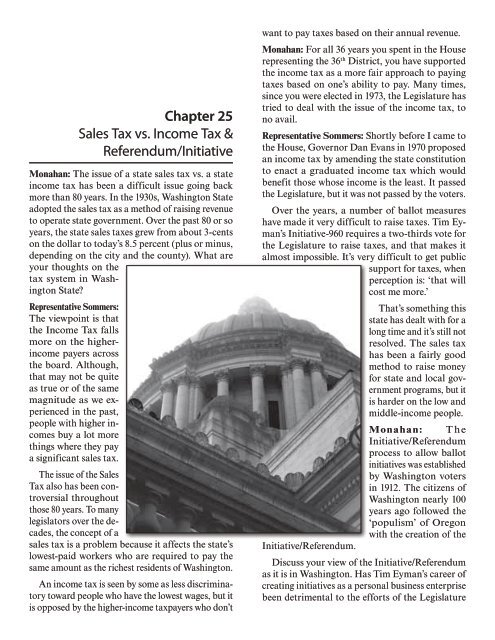Helen Sommers: An Oral History
Helen Sommers: An Oral History
Helen Sommers: An Oral History
You also want an ePaper? Increase the reach of your titles
YUMPU automatically turns print PDFs into web optimized ePapers that Google loves.
Chapter 25<br />
Sales Tax vs. Income Tax &<br />
Referendum/Initiative<br />
Monahan: The issue of a state sales tax vs. a state<br />
income tax has been a difficult issue going back<br />
more than 80 years. In the 1930s, Washington State<br />
adopted the sales tax as a method of raising revenue<br />
to operate state government. Over the past 80 or so<br />
years, the state sales taxes grew from about 3-cents<br />
on the dollar to today’s 8.5 percent (plus or minus,<br />
depending on the city and the county). What are<br />
your thoughts on the<br />
tax system in Washington<br />
State?<br />
Representative <strong>Sommers</strong>:<br />
The viewpoint is that<br />
the Income Tax falls<br />
more on the higherincome<br />
payers across<br />
the board. Although,<br />
that may not be quite<br />
as true or of the same<br />
magnitude as we experienced<br />
in the past,<br />
people with higher incomes<br />
buy a lot more<br />
things where they pay<br />
a significant sales tax.<br />
The issue of the Sales<br />
Tax also has been controversial<br />
throughout<br />
those 80 years. To many<br />
legislators over the decades,<br />
the concept of a<br />
sales tax is a problem because it affects the state’s<br />
lowest-paid workers who are required to pay the<br />
same amount as the richest residents of Washington.<br />
<strong>An</strong> income tax is seen by some as less discriminatory<br />
toward people who have the lowest wages, but it<br />
is opposed by the higher-income taxpayers who don’t<br />
want to pay taxes based on their annual revenue.<br />
Monahan: For all 36 years you spent in the House<br />
representing the 36th District, you have supported<br />
the income tax as a more fair approach to paying<br />
taxes based on one’s ability to pay. Many times,<br />
since you were elected in 1973, the Legislature has<br />
tried to deal with the issue of the income tax, to<br />
no avail.<br />
Representative <strong>Sommers</strong>: Shortly before I came to<br />
the House, Governor Dan Evans in 1970 proposed<br />
an income tax by amending the state constitution<br />
to enact a graduated income tax which would<br />
benefit those whose income is the least. It passed<br />
the Legislature, but it was not passed by the voters.<br />
Over the years, a number of ballot measures<br />
have made it very difficult to raise taxes. Tim Eyman’s<br />
Initiative-960 requires a two-thirds vote for<br />
the Legislature to raise taxes, and that makes it<br />
almost impossible. It’s very difficult to get public<br />
support for taxes, when<br />
perception is: ‘that will<br />
cost me more.’<br />
Initiative/Referendum.<br />
That’s something this<br />
state has dealt with for a<br />
long time and it’s still not<br />
resolved. The sales tax<br />
has been a fairly good<br />
method to raise money<br />
for state and local government<br />
programs, but it<br />
is harder on the low and<br />
middle-income people.<br />
Monahan: The<br />
Initiative/Referendum<br />
process to allow ballot<br />
initiatives was established<br />
by Washington voters<br />
in 1912. The citizens of<br />
Washington nearly 100<br />
years ago followed the<br />
‘populism’ of Oregon<br />
with the creation of the<br />
Discuss your view of the Initiative/Referendum<br />
as it is in Washington. Has Tim Eyman’s career of<br />
creating initiatives as a personal business enterprise<br />
been detrimental to the efforts of the Legislature
















